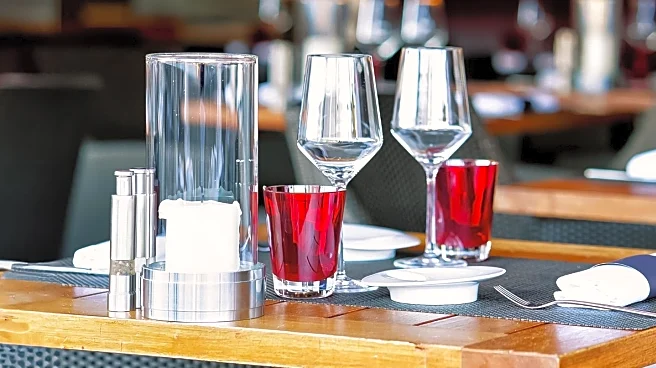What's Happening?
Baptiste Beaumard, a sommelier at New York's Michelin-starred Restaurant Daniel, addresses the use of wine apps like Vivino in fine dining settings. Beaumard emphasizes that while sommeliers are often
perceived as intimidating, their primary role is to make guests comfortable and connect them with the perfect wine for their taste and budget. He advises diners to leverage the expertise of sommeliers, who can guide them to excellent wine choices without necessarily opting for the most expensive bottles. Beaumard also suggests discreet ways to communicate budget preferences and highlights lesser-known wine regions that offer great value. He acknowledges that wine apps can be useful for cataloging personal preferences but cautions against relying solely on them over expert advice.
Why It's Important?
The discussion around wine app usage in restaurants highlights the evolving dynamics between technology and traditional dining experiences. As wine apps become more prevalent, they offer consumers a tool to make informed choices, potentially democratizing access to wine knowledge. However, the reliance on apps could undermine the role of sommeliers, who provide personalized recommendations based on extensive training and experience. This shift could impact the hospitality industry, where the human touch is a key component of the dining experience. Restaurants may need to adapt by integrating technology while preserving the value of expert guidance, ensuring that diners receive both convenience and quality service.
What's Next?
Restaurants may increasingly incorporate technology into their wine service, potentially offering digital wine lists or app integrations to enhance customer experience. Sommeliers might need to adapt by becoming more tech-savvy, using apps to complement their recommendations. As consumers become more informed through technology, the role of sommeliers could evolve to focus more on personalized service and unique wine experiences. The industry may also see a shift in wine marketing strategies, with lesser-known regions gaining popularity through app recommendations, influencing wine production and distribution trends.
Beyond the Headlines
The integration of wine apps in dining settings raises questions about the balance between technology and tradition. Ethical considerations may arise regarding data privacy and the influence of consumer reviews on wine choices. The cultural shift towards tech-driven dining experiences could impact the perception of luxury and exclusivity in fine dining. Long-term, this trend might lead to a broader acceptance of diverse wine regions, challenging established norms and potentially reshaping the global wine market.










